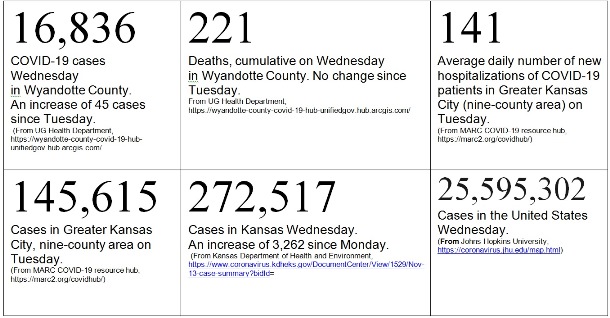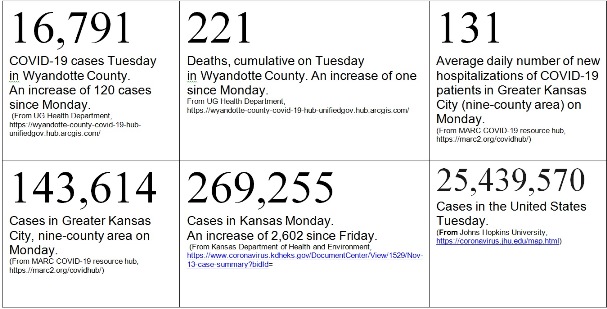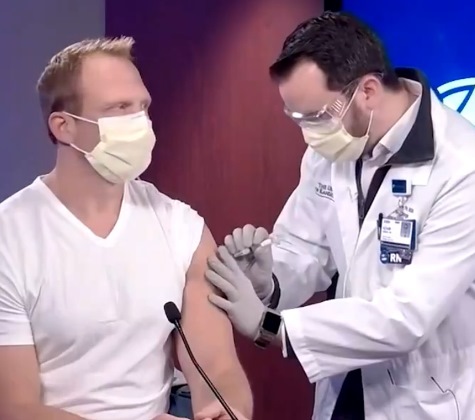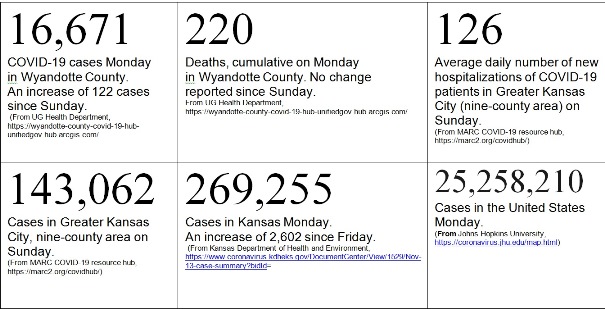
The Biden administration has announced a 16 percent increase in the amount of vaccine that states will receive next week, according to Gov. Laura Kelly.
The state’s biggest challenge has been the shortage of vaccine from the federal level, the governor said Wednesday.
Gov. Kelly, in a news conference, said the administration has committed to give states three-week forecasts on the amount of vaccine they will receive.
Since the vaccination process started, the states only heard on a week-by-week basis how much vaccine they would receive, she said. That created a “weekly logistical fire drill,” she said.
The three-week forecast is expected to help the communities and state improve the vaccination process.
Gov. Kelly said Kansas will receive 17,550 COVID-19 prime vaccine doses from Pfizer and 23,500 prime vaccine doses from Moderna next week.
The state’s Kansasvaccine.gov website on Wednesday reported a total of 149,078 people have been vaccinated, with 177,350 total doses administered. There were 149,246 first doses reported administered and 28,105 second doses reported administered. The total doses distributed were 392,675, which included the state distributing 300,050 and the federal long-term care program distributing 92,625. The percent of Kansans vaccinated was 5.1%.
The governor thanked residents for their patience and understanding as the state does everything within its power to speed up the vaccination process. Although there is light at the end of the tunnel, it will take many months to bring COVID-19 under control, she added.
Gov. Kelly said the amount of vaccine each county receives is being posted on the state’s website, kansasvaccine.gov.
She said the Kansas Department of Health and Environment considers several factors when it determines how many vaccines are being sent to counties, including population size, priority groups, whether the provider can ensure the vaccine will be kept frozen if necessary, how many people the provider can vaccinate at a given time period, and the risk of illness and death in the community served, the social vulnerability index.
The KDHE’s list of the counties receiving the most vaccines in the week of Jan. 25 included:
• Johnson County, 6,825 doses, population 602,401.
• Sedgwick County, 5,850 doses, population 516,042.
• Douglas County, 2,950 doses, population 122,259.
• Wyandotte County, 1,950 doses, population 165,429.
• Shawnee County, 1,950 doses, population 176,875.
• Leavenworth County, 900 doses, population, 81,758.
• Riley County, 900 doses, population 74,732.
(Population figures from U.S. Census, July 2019)
The full list of counties is at kansasvaccine.gov. Long-term care facilities vaccines are not counted in these numbers, according to officials, as those vaccines go directly from the federal government to pharmacies administering the doses.
During the news conference, Gov. Kelly recognized Travis Lanter, a Unified Government Health Department employee, as the Public Health Hero of the Week. The governor said Lanter has worked for months to break down barriers and make sure everyone is included in the vaccination effort. He has set up wheelchairs for those who have difficulty standing, has provided non-English translation materials and developed ideas for site workflow, she said. He also consulted with other counties on vaccination site design.
Dr. Lee Norman, Kansas secretary of health, said at the news conference that Kansas used a “hub and spoke” model for the first phase. Part of the reason was ultra-cold storage was needed for the Pfizer vaccine. The vaccines were sent from the state to five spokes, which then sent them on to local sites.
They are now using a different model, shipping vaccines from a distribution center directly to local health departments, which determine how to vaccinate their communities in Phase 2, he said. The local health departments have flexibility in determining how to distribute the vaccines in their communities, he said.
Wyandotte County recently announced that its priority in Phase 2 would be vaccinating high-contact essential workers first, followed by congregate settings and those 65 and older.
Dr. Norman recognized the frustration that some have regarding the vaccine availability and said they share the frustration. The KDHE and the state are in regular conversation with the federal delegation and the White House about the need for more vaccine, he said.
He said the vaccines sent by the state go more sites than health departments, and include safety net clinics and hospitals. In the future, pharmacies, clinics, doctors’ offices and mobile vaccination sites will be added, he said.
The KDHE will have a feature on its vaccine website soon showing where vaccinations are available, he said.
Also, Dr. Norman said the KDHE is now doing more genomic sequencing of certain COVID-19 cases. For example, it is doing genomic sequencing from a correctional facility where the disease spread very rapidly, more rapidly than usual. They are trying to determine if one of the variants that spreads faster was involved. They are awaiting test results on it.
U.S. Sen. Jerry Moran, appearing on the University of Kansas Health System’s news conference Wednesday morning, said he is looking into the vaccine situation to find out how more vaccine can be made and how the distribution can be simplified.
He is also part of a group in the Senate that is working on the next federal COVID-19 relief package. He mentioned there were some differences among senators on the relief package, with some opposition to direct state and local government assistance, but perhaps a compromise could be reached on providing specific funding to functions such as police, fire and health services provided by the local governments.
Dr. Jessica Kalender-Rich, national member of the Coronavirus Commission for Safety and Quality in Nursing Homes, provided an update on the vaccinations at nursing homes. All of the long-term care facilities have been offered their first dose by the pharmacies designated to provide them, she said. The vaccinations have been well received by residents, but there are challenges in staff acceptance of it, according to Dr. Kalender-Rich.
Nursing homes are waiting on more guidance from the federal government regarding vaccines and nursing home visitors, according to Dr. Kalender-Rich.
Sen. Moran, Dr. Kalender-Rich and Dr. Steve Stites, chief medical officer at KU Health System, encouraged residents to continue wearing masks and distancing whether or not they have received the vaccine yet.
Dr. Dana Hawkinson, medical director of infection prevention and control at KU Health System, said he had no side effects from his second vaccine, except a sore shoulder. People need to be aware that they need to wear masks and distance even after being vaccinated because they can still transmit the virus after they’re fully immunized, he said. The rate of new cases has been declining not because of the vaccines, but because of a culture change where people have been wearing masks, he said.
Dr. Stites said he has been taking a lot of calls about vaccine availability, and it now appears there are more people out there who want vaccines than there are vaccine-deniers. He is in favor of increasing the supply of vaccine, but he also noted that masks work and that hospitals are safe because masks work.
How to get a COVID-19 vaccine
Wyandotte County residents who are interested in getting a COVID-19 vaccine may fill out a survey form at the Unified Government Health Department at https://us.openforms.com/Form/2f2bcc68-3b6a-450b-9007-d39819db6572. Residents will be contacted to make an appointment when vaccine becomes available.
The KU Health System has vaccinated its employees, and some of its patients. After about 70 percent of its staff was vaccinated, and some of the staff did not want the vaccine, the remainder of its staff vaccine was given to some patients and some was shared with the community health departments. It would like to help give vaccines if more becomes available. Others who are interested in receiving a COVID-19 vaccine there, if vaccine is available, may fill out a form, and vaccinations may be scheduled if there is available vaccine. The form is online at https://www.kansashealthsystem.com/patient-visitor/covid19-update/covid-vaccine-form.
COVID-19 case numbers reported
The University of Kansas Health System reported 60 active COVID-19 patients in the hospital, a decrease of three since Monday, according to Dr. Hawkinson. There were 11 patients in the intensive care unit, down five from Tuesday, and 10 of the ICU patients were on ventilators on Wednesday, a decrease of one since Tuesday. There were an additional 52 COVID-19 patients hospitalized who were out of the acute phase, a decrease of five since Tuesday. There was a total of 112 COVID-19 patients, a decrease of eight since Tuesday.
Wyandotte County reported an increase of 45 COVID-19 cases on Wednesday, Jan. 27, according to the Unified Government’s COVID-19 webpage. There were a cumulative 16,836 cases. There was a cumulative total of 221 deaths, the same as Tuesday.
The Mid-America Regional Council’s COVID-19 dashboard reported 145,615 cumulative COVID-19 cases on Tuesday. There were 1,825 cumulative deaths, and 141 was the daily average of new hospitalizations.
The state of Kansas reported 272,517 COVID-19 cases statewide on Wednesday, an increase of 3,262 cases since Monday, according to the Kansas Department of Health and Environment. There were an additional 96 deaths reported, with a cumulative total of 3,718.
The Johns Hopkins University COVID-19 dashboard on Wednesday night reported 25,595,302 total cumulative cases in the United States, with 429,157 total deaths nationwide.
Free COVID-19 testing available Thursday
COVID-19 tests will be available Thursday, Jan. 28, at the Pierson Community Center parking lot, 1800 S. 55th St., Kansas City, Kansas. Hours are subject to change depending on the weather and other factors. These tests are through WellHealth Management. Appointments are required. For more information and to schedule a test, visit www.GoGetTested.com/Kansas.
The Unified Government Health Department’s COVID-19 test site at the former Kmart building at 78th and State will be open from 9 a.m. to 3 p.m. on Thursday, Jan. 28. Appointments are not needed. To see if there is any change to the schedule, visit https://www.facebook.com/UGHealthDept.
The UG Health Department recently added flu testing to the COVID-19 test at the Kmart building. Only one swab is used for the two tests. The Health Department estimates a two- to three-day wait for COVID-19 results. For the flu, the department only contacts people if it is positive.
Tests from the Health Department are free for those who live or work in Wyandotte County. The tests are nasopharyngeal swab tests. The Health Department no longer uses saliva tests.
The tests are open to asymptomatic people as well as those who have symptoms or have been exposed to COVID-19. Check with the UG Health Department’s Facebook page to see if there have been any changes in the schedule. Bring something that shows that you live or work in Wyandotte County, such as a utility bill.
Wyandotte County residents who are interested in getting a COVID-19 vaccine may fill out a survey form at the UG Health Department at https://us.openforms.com/Form/2f2bcc68-3b6a-450b-9007-d39819db6572. Residents will be contacted to make an appointment when vaccine becomes available.
Testing sites are at https://wyandotte-county-covid-19-hub-unifiedgov.hub.arcgis.com/pages/what-to-do-if-you-think-you-have-covid-19.
For more information about the testing site at the former Kmart location, visit https://alpha.wycokck.org/files/assets/public/health/documents/covid/10092020_newtestingsitewyco.pdf.
The governors’ news conference is at https://www.facebook.com/GovLauraKelly/videos/418828329381137.
The KU doctors’ news conference is online at https://www.facebook.com/kuhospital/videos/421986922451817.
.
The new health order on hours for bars and restaurants is at https://alpha.wycokck.org/files/assets/public/health/documents/localhealthofficerorder011221.pdf.
Information about the new health order on extended hours for bars and restaurants is at https://alpha.wycokck.org/files/assets/public/health/documents/covid/01112021ugissuesnewbarrestaurantorder.pdf.
The school health order is online at https://alpha.wycokck.org/files/assets/public/health/documents/covid/localhealthofficerschoolorder01042021.pdf.
A letter explaining the school health order is online at https://alpha.wycokck.org/files/assets/public/health/documents/covid/schoolletter_01052021_english.pdf.
To see information about the UG giving vaccines to health care workers, visit https://wyandotteonline.com/ug-to-start-giving-covid-19-vaccines-to-health-department-and-ems-personnel-next-week/.
The KDHE vaccine report is at https://www.kansasvaccine.gov/DocumentCenter/View/123/Vaccine-Historical-Document-12121?bidId=
Cards and letters of encouragement for caregivers at KU Health System may be sent to Share Joy, care of Patient Relations, 4000 Cambridge St., Mailstop 1021, Kansas City, Kansas, 66160. Emails can be sent to [email protected].
Wyandotte County is under a mandatory mask and social distancing order.
The UG COVID-19 webpage is at https://alpha.wycokck.org/Coronavirus-COVID-19-Information.
The KDHE’s COVID-19 webpage is at https://www.coronavirus.kdheks.gov/.
The KC Region COVID-19 Hub dashboard is at https://marc2.org/covidhub/.
The Wyandotte County page on the Johns Hopkins COVID-19 website is at https://bao.arcgis.com/covid-19/jhu/county/20209.html.



